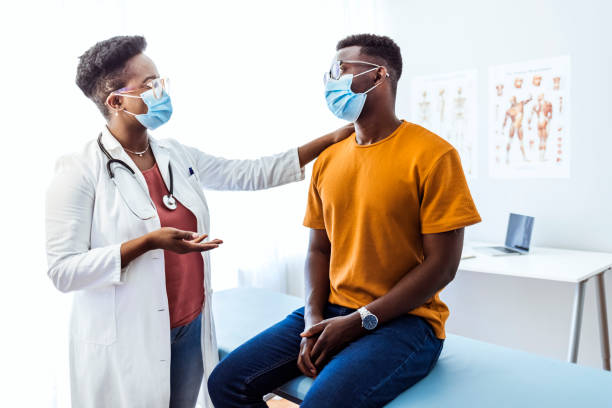
For a year and a half Americans looking to get a COVID-19 vaccine have had the same three options to choose from. However, if you are planning to get vaccinated in the near future, you now have another option to consider. The FDA has officially authorized the Novavax COVID-19 vaccine for emergency use in the U.S., and if you are skeptical of mRNA tech, this may be the perfect option. In fact, experts are hopeful that this option may boost the number of new COVID vaccinations in the U.S., which have stalled a bit according to data from the Centers for Disease Control and Prevention (CDC).
Pfizer-BioNTech and Moderna were approved for use following their individual authorizations, meanwhile, the Johnson & Johnson COVID-19 vaccine is still operating under an emergency use authorization with restrictions, SELF notes.
People ages 18 and up will be able to get the Novavax vaccine, which the Biden administration has already ordered 3.2 million doses of. This will be enough to vaccinate 1.6 million Americans.
So how exactly does this vaccine work and how does it differ from the mRNA options? Here's everything you need to know about the Novavax vaccine before you head out to your nearest vaccination location.
RELATED: A Guide to Help You Keep Up With the Omicron Subvariants
How does the Novavax vaccine work?
The Novavax vaccine will be administered in two doses just like the Pfizer and Moderna vaccines with each vaccine spaced three weeks apart.
The biggest thing that sets the Novavax vaccine apart from Pfizer and Moderna, however, is that it isn't an mRNA vaccine, but what exactly does this mean?
To understand this, let's take a look at how an mRNA vaccination works. An mRNA vaccine, like the ones Pfizer or Moderna use, work by using messenger RNA (which carries information from the DNA in a cell’s nucleus) that is created in a lab to teach the body how to create an immune response, according to the CDC.
Novavax, on the other hand, is protein-based, which means no mRNA is required.
Wondering how this all works?
Let's break it down.
In order to create the vaccine, scientists used the spike protein from the genetic sequence of SARS-CoV-2, the virus that causes COVID-19. This spike protein is what allows the coronavirus to latch onto and enter human cells.
Once created, researchers take this modified spike protein gene and insert it into a baculovirus (a.k.a. an insect virus), the FDA notes. That virus is then used to infect insect cells.
From there, new spike proteins grow, which are harvested and used to mimic SARS-CoV-2. This sets off an immune response, which prevents the vaccine from actually making you sick.
After you are vaccinated, your body will perceive the altered proteins as a threat and produce antibodies that will jump into action, if you contract COVID in the future.
One benefit of the Novavax vaccine is that it contains adjuvant, which is used in certain vaccines to create a stronger immune response, according to the CDC.
What about side effects?
This sounds great, but you're probably wondering if you can expect any side effects with this new vaccine. In short, it is a possibility. Similar to any other vaccine you take, you may experience short-lived side effects after your dose. In general, these side effects are similar to the ones you may experience with the other COVID vaccines. According to the FDA, they include: pain or swelling at the injection site, fatigue, headache, fever, and generally feeling unwell as your body ramps up its immune response.
How effective is the Novavax vaccine?
Another concern of yours may be whether or not the Novavax vaccine is actually effective at protecting you. Here's what the data from clinical trials show.
The Novavax vaccine is up to 90.4% effective at preventing COVID-19, according to data from a 2021 phase three clinical trial published in the New England Journal of Medicine.
“Of the two phase three trials, both found that the efficacy of the vaccine against mild, moderate, and severe disease is 90%,” the World Health Organization says.
As for how the Novavax vaccine stacks up against highly infectious Omicron subvariants such as BA.5? The vaccine was studied from December 2020 through September 2021 (before the subvariants began circulating), so this information isn't readily available.
RELATED: As Cases Rise, Here’s How to Protect Yourself From COVID BA.5
The importance of having another vaccine option
Some people were the first in line to get vaccinated, while others needed some more convincing. Whatever the case, the people who are interested in getting vaccinated have more than likely done it by now, so what's the point of a new vaccine?
According to health experts, another vaccine is a great way to take a positive step forward in our pandemic response because it provides people with another option, and who doesn't like options?
Another benefit to providing people with the option to receive the Novavax vaccine is that it may convince some people that haven't gotten vaccinated due to their fears of mRNA technology. The Novavax vaccine is manufactured like more “traditional” vaccines—including the flu vaccine—which could potentially “allay some people’s fears” and encourage those who didn’t want to get an mRNA vaccine to move forward with immunization, Richard Watkins, MD, an infectious disease physician and professor of internal medicine at the Northeast Ohio Medical University, tells SELF.
“A significant amount of false information was spread around the safety of the mRNA vaccines and there was suspicion among the general public of these vaccines,” Russell Lampen, DO, an infectious disease specialist with Spectrum Health, tells SELF.
Although the mRNA vaccines have been established as safe and effective, it is understandable that Americans may still be concerned about how they may affect their health. However, because Novavax uses “very established technology”, people who are hesitant might be more open to getting vaccinated.
Another benefit? Different types of vaccines can offer health experts strategic ways to fight the same pathogen.
“We may find over time that some are more effective than the others,” Perry N. Halkitis, PhD, MPH, dean of the Rutgers School of Public Health, tells SELF. “Having different technology is important.” Dr. Halkitis adds, “this vaccine provides another tool in the arsenal to fight this microbe.”
As for when the Novavax vaccine will be available to Americans? CDC officials will be meeting to discuss who it should be recommended for.
PLEASE NOTE: Novavax hasn’t been authorized as a booster vaccine, just an original series.









